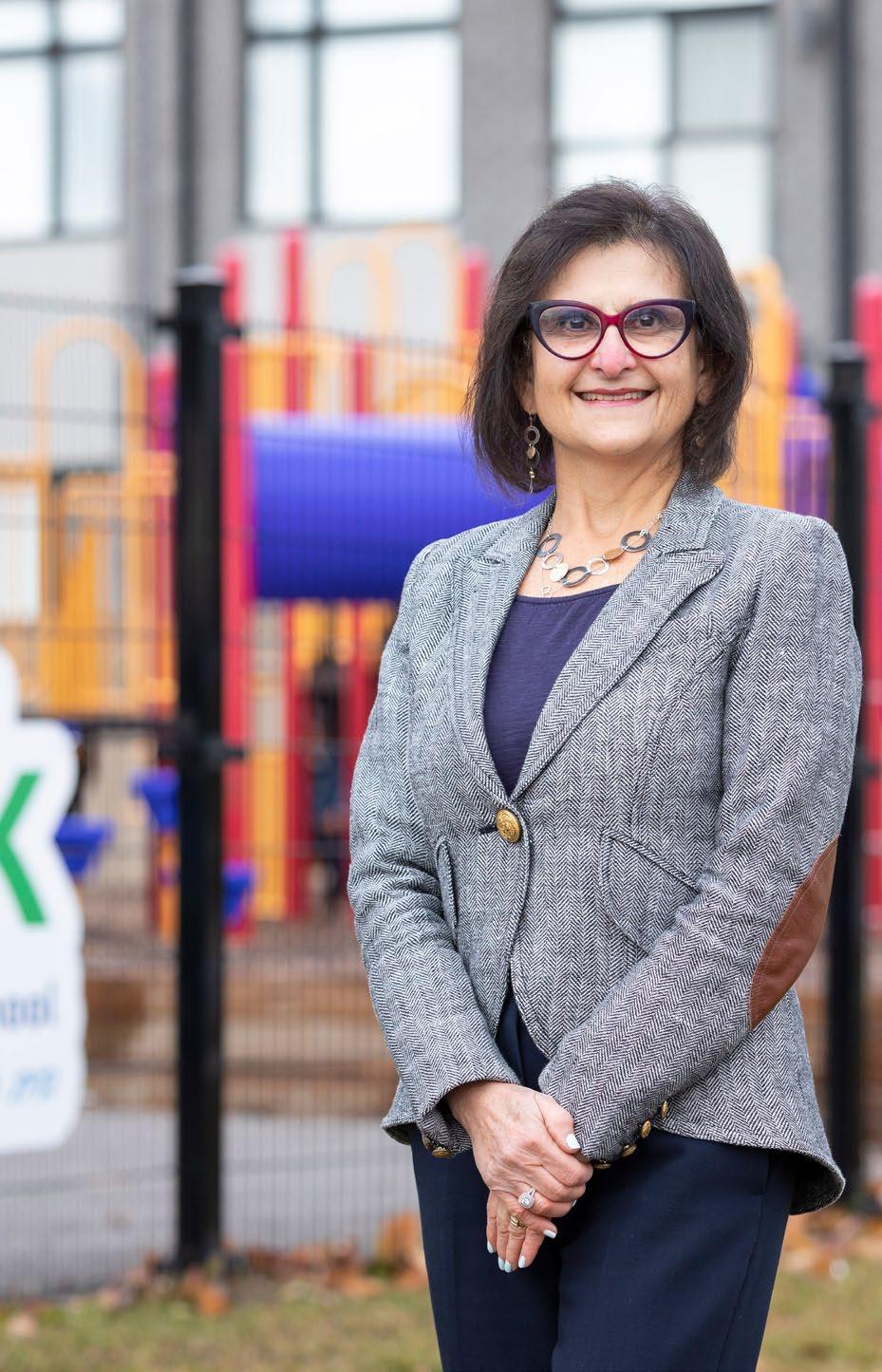
26 minute read
Community builder Beverley Young retires
A COMMUNITY BUILDER WHOSE HEART BEATS BIALIK BLUE
hen Beverley Young, Principal of the
WHimel Branch, made Canada home four decades ago, she also found a home at Bialik. When she sings, “Walking down the halls, Bialik is my home,” Beverley truly means it, as she now reflects on her long career ahead of her retirement this June.
After arriving in Canada from South Africa, Beverley joined Bialik as a part-time French teacher. A self-described “high energy” person, she loved teaching français à la carte, literally rolling a cart of supplies from one classroom to the next.
“Every 30 minutes, there was a new lesson, new students to teach. I could think creatively about how I’d bring Jewish holiday themes to life through song, and inspire a love for the language,” Beverley says.
And the longer she stayed, the more she built her life here. Beverley and her family lived in the Viewmount community, with fellow Bialik parents as friends and neighbours. All the while, Beverley grew too. She moved on from teaching to become Viewmount’s Senior Division Coordinator, a role that later became Vice Principal, and, in 2013, she opened the Himel Branch as its Principal.
Beverley put all her energy into building the strong, vibrant and connected community we now have at Himel. Under her dynamic leadership, the branch grew from 64 students in its first year to well over 525 students enrolled this year!
“I am so grateful to the people who believed in me, gave me opportunities for learning and personal growth, and the chance to be part of this amazing journey,” she says. “I am also grateful to the donors who helped Bialik expand in the north.”
Himel Principal Beverley Young is excited for her next chapter.
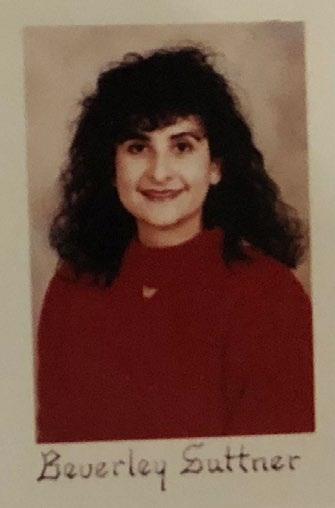
Not only did Beverley build a career, a community and a family here but she also saw the construction and expansion of new facilities at both Viewmount and Himel Branches. “I lived through many phases of construction to see dreams come true through bricks and mortar,” she says.
Beyond the many ribbon-cutting ceremonies, Beverley played a role in numerous Bialik milestones including the celebration of our school’s 40th and 50th anniversaries and the Jerusalem 3000 production. Other programs that bear her signature include the introduction of Flag Day at Himel, Panorama in Senior Division, the I ❤ Bialik Living Room Concert and the online student talent show during COVID.
“When parents choose a school and a Jewish education, they are looking not only for an excellent program but also for a community and a place to belong,” she says. “That’s part of our success. Our families become part of a larger collective of supportive relationships.” Community building is something Beverley’s proud of, although she speaks of the success as a team effort.
With her total commitment to Jewish education, Beverley’s impact is evident in many curricular and extra-curricular developments — such as the maturation of the Mechanech program, the expansion of Bialik’s athletics program, and our very dynamic House program. And, as a community builder, Beverley leaves an indelible mark.
The special school ceremonies and parties that connect the community are some of her most important memories. Now, it’s time for her to be available to attend her family’s simchas. “I have 10 grandchildren. There have already been two Bnei Mitzvah, my son’s wedding is coming up and there are more simchas down the road. I look forward to being able to attend all of them,” she says. That will mean travel to visit her children’s families in Australia and Israel. Beverley is looking forward to the new adventure, saying, “The canvas is ready to be painted.” As she reflects on her Bialik career, Beverley speaks most passionately about her students. She refers to the special relationships she’s formed and the joy she derives from their successes. This attention to her students as individuals has allowed her to maintain strong connections with alumni, many of whom have become Bialik parents or staff. She expresses the hope that Bialik students, past and present, will continue to celebrate their Jewish identity and embrace a strong sense of heritage, both of which have never been more important. There’s no question that Beverley has laid a strong foundation for many students, as well as for her family, to take this path.
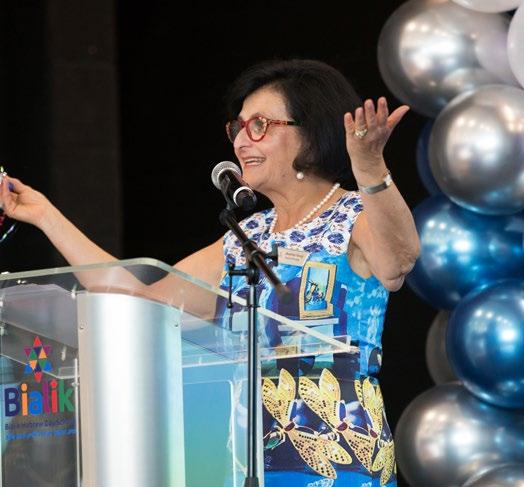
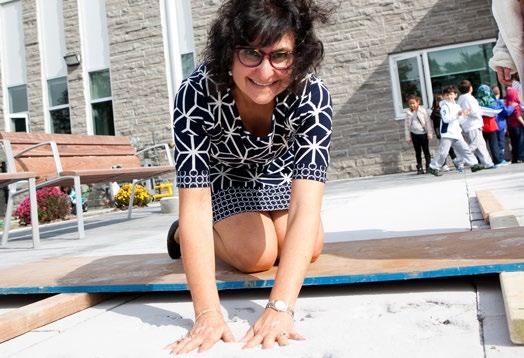
WELL-BEING IS ESSENTIAL TO STUDENTS’ SUCCESS
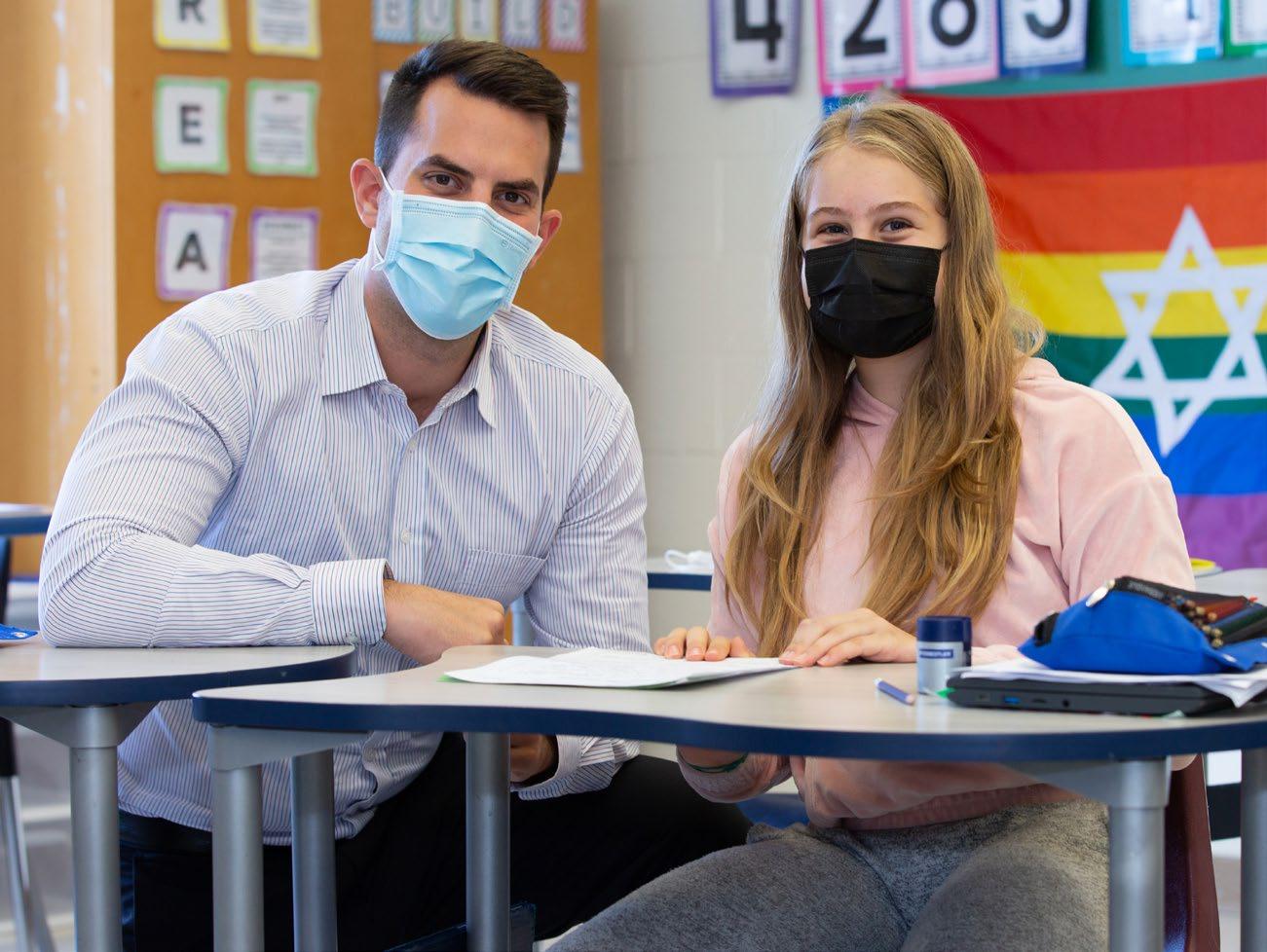
Teaching the Whole Child
alk into a Bialik hallway after the morning bell and you’ll
Wsee students lined up along the wall. Before entering the classroom and heading to their seats, each student connects briefly with their teacher, giving and receiving personalized greetings. Greetings could be in the form of an air hug or high five, a quick dance or a kindly hello. Setting the stage for the rest of the day, this quick interaction provides “an immediate one-on-one connection between teacher and student,” explains Jake Gallinger, Principal of the Viewmount Branch.
“Returning to school post-pandemic, it’s clear that taking care of our students’ social-emotional well-being, and ensuring they feel well cared for is more important than ever,” says Jake.
Early reflections on students’ progress during the pandemic showed that they had not necessarily fallen as far behind as anticipated on curriculum or test scores, but that the social aspect had become stalled. This has become a priority at Bialik, with social-emotional well-being being incorporated into all aspects of school life.
The teachers’ usual introductory phone calls with Bialik parents at the start of the school year became so much more significant this year. “Those calls helped uncover how kids are doing and what we can do to support them,” Jake says. In planning for the school year, Bialik recognized how closely students’ academic success is interlinked with their emotional skills, their identity, sense of well-being, and their relationships with peers. The school wants to make sure that each and every child can be successful as they return to being part of the whole in-school community. This includes providing differentiated student support to cater to the individual needs of each child and directly addressing all aspects of “the whole child.”
The teachers’ warmth and their interactions with each individual student demonstrate this philosophy. But the school is going even further. Based on research and consultation, Bialik is focusing on four themes for the students’ well-being that will complement the school’s academic program: inclusivity, social-emotional learning, mental health and sex education, and digital citizenship.
“The morning greeting time ensures each child is included,” says Jake. Identifying and naming emotional states during the “well-being check” not only supports social-emotional learning but also the four themes. He points out that for instance, a teacher might discover that, a child is struggling because of something they saw on social media, providing an opportunity to teach and address issues of good digital citizenship.
All of this reflects the school’s efforts to integrate students’ wellness into the daily experience at Bialik, rather than as a curriculum to be taught once per year or as an issue to be handled by the School Counsellor. All teachers are already participating in increased professional development on how to include these concepts in their everyday practice.
Ultimately, Bialik’s Branch Principals will know that this team effort is succeeding by the nature of the frequent conversations they have with parents indicating that kids are well and progressing. Another clue will be a decrease in the number of visits to the School Counsellor, as will fewer behavioural issues resulting in visits to the Vice Principal’s office. In fact, Jake hopes that some of the efforts to address the four themes of teaching the whole child don’t stand out as being special. “They should be natural, daily occurrences that are woven into our cross-curricular conversations,” he says. When students have strong relationships, identities, emotional skills and an overall sense of well-being, they have the foundation for continued success at Bialik and beyond.
FOUR THEMES FOR STUDENT WELL-BEING
Bialik has set up the following joint admin-faculty committees to focus on creating a learning environment that promotes the needs of the whole child:
SOCIAL-EMOTIONAL LEARNING
Meeting the social and emotional needs of all Bialik students is an integral aspect of our mission. The Social-Emotional Learning Committee aims to create a common and shared vocabulary that all Bialik students, teachers and staff can use to understand and support each other. The committee will evaluate all areas of school life and determine how to ensure that our students’ social and emotional needs are being met throughout all grades.
INCLUSIVITY
This committee will continue its work from two years ago, using our inclusivity mission statement. It will now turn attention to curricular connections at all grade levels and across both curricula. It will help plan how to mark Pride Month in a way that will be meaningful and integrate logically with our mission of Jewish education.
MENTAL HEALTH AND SEX EDUCATION
The focus of the Mental Health and Sex Education Committee will be on helping students learn the skills and knowledge they need to lead healthy, active lives and make healthy and safe choices. The committee will create a scope-and-sequence plan that includes social-emotional learning skills, mental health literacy, connections between physical and mental health, body image, consent and online safety, and age-appropriate sexual health education.
DIGITAL CITIZENSHIP
The goal of the Digital Citizenship Committee is to help students develop responsible and appropriate online behaviours and to support teachers with a meaningful integrated curriculum to teach positive digital citizenship. Topics will include digital etiquette and safety, digital footprint and communication, digital literacy, digital rights, and digital health and wellness.
RED WRIGGLERS TEACH
hat do vegetable scraps, Red Wrig-
Wgler worms, garbage and paper scraps have in common? Normally, one’s response may be “ew,” but that’s not the case at Bialik, where these are all important components of our new, hands-on STEM composting program. This year, SK students were introduced to concepts of food sustainability, composting, reusing and recycling. Most importantly, they learned that even the smallest of adjustments to their practices and routines can make a big, positive impact on the world around them.
Working with STEM Coordinator Shawn Stevens, or Farmer Shawn as he’s known, students learned that not everything belongs in the garbage can. They sorted through items typically thrown away, categorizing them as “green,” “brown,” or “non-compostable,” discovering that many items not fitting these categories may be reused or repurposed. The goal was to teach the students that we all need to do our best to divert items from going into landfill in order to keep the earth healthy.
Students learned that Red Wiggler worms are effective composters. One enthusiastic student remarked, “My favourite part about worms is that they poop — that was so funny!” What students soon discovered is that worm castings are important in the composting process.
According to Shawn, the most important part about growing a healthy garden is to have healthy soil, rich with nutrients. “Many believe that we start with the seeds, but it’s actually all about the soil. Any farmer will say that you’re actually growing soil and anything that comes out of that is a bonus,” he says.
Each SK class received their own green composting bin complete with moist shredded paper and Red Wiggler worms. When asked about their favourite part of the unit, the students’ unanimous response was: “Feeding the worms!” One student pointed to the chart on the wall and relayed that it was very important to put the right food in the compost bin.
SK Himel teacher, Vannessa Lang, is very impressed with how much the children understood about taking care of their compost bin. “Our students have been taking very good care of our worms,” she says. “They make sure that they are fed the correct foods and that the lid stays on nice and tight so the worms are in a dark and safe space. They are looking forward to spreading the compost soil on the school garden. I’m very impressed with how much information they have retained.”
Shawn received an email from a parent who was thrilled with this project, explaining that their child previously did not enjoy going outside to play because they didn’t like to get dirty. Now, they’re digging in the backyard looking for worms, looking through the garbage to find vegetables, and explaining how these worms help to fertilize the soil so we can grow more food.
The students are really looking forward to the next steps in the program, when Farmer Shawn will show them how to harvest the worm castings and refill their compost bin. They are particularly proud to know that their compost will be used to feed the many vegetables grown at Bialik, bringing this process through its full cycle.
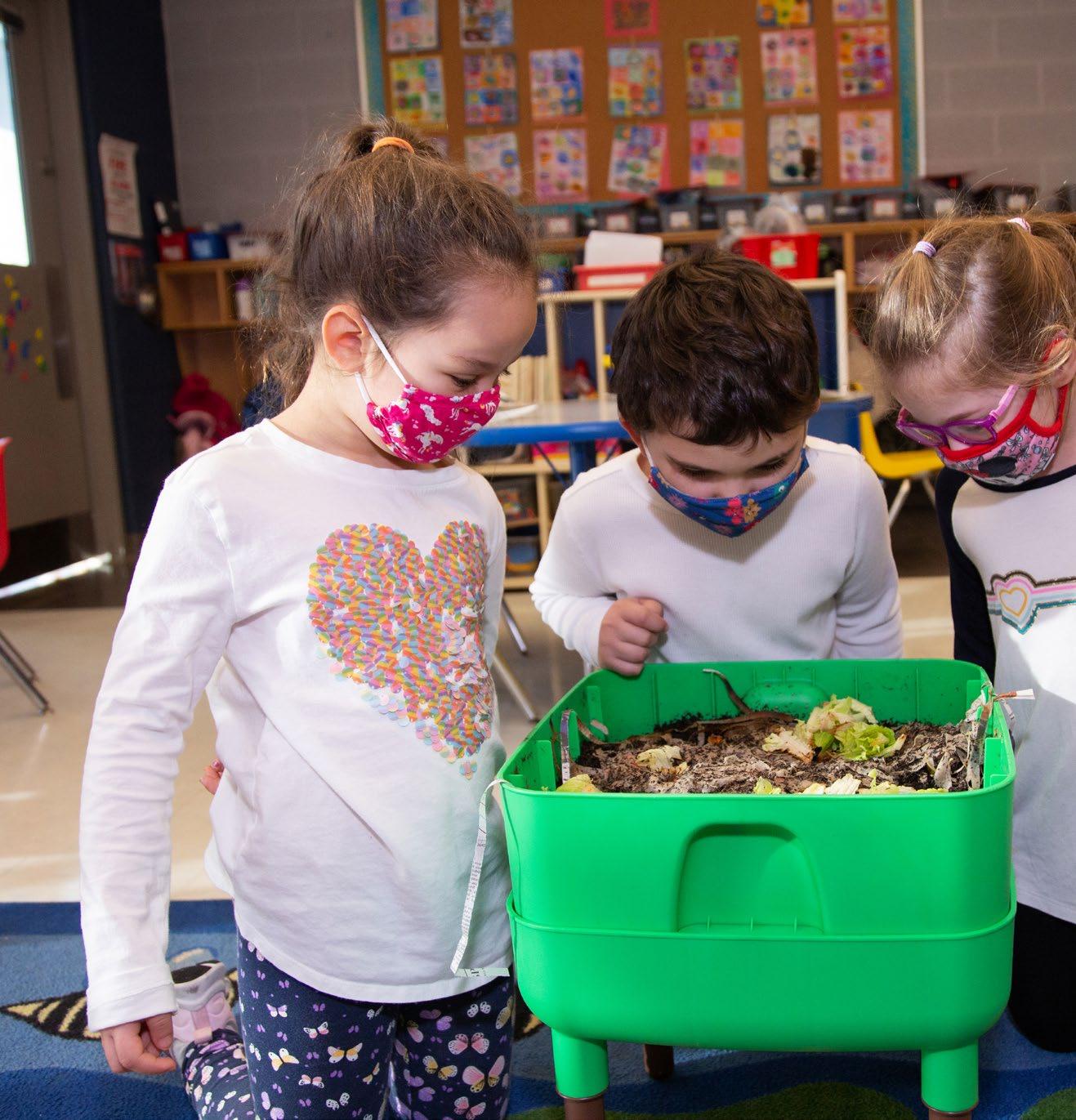
IMMERSED IN IVRIT AND MORESHET
ebrew fluency and a strong connection to
HIsrael have long been hallmarks of a Bialik education. There is nothing like our Nachas when we hear stories of our students visiting Israel for the first time and being able to converse with Israelis. But last year, our educational leaders asked the question: How can we deepen the connection to our Jewish heritage, culture and language even further?
Inspired, our Jewish Studies faculty began research, brainstorming and shaping of ideas to develop several exciting new initiatives. The first was the creation of an immersive Hebrew environment in Senior Kindergarten, placing Hebrew-speaking assistants in every class; the second was the introduction of the Moreshet course in the Senior Division.
After the first term, we are already seeing great results in Senior Kindergarten. “Parents are giving us wonderful feedback about how excited their children are to share all the new Hebrew words they’re learning,” says Viewmount Primary Division Vice Principal, Karen Lidor. “We’re seeing students who have the same zest for Ivrit as for their other academic and extracurricular activities.”
“Hebrew-speaking assistants provide authentic, immersive opportunities for learning Hebrew throughout the school day,” explains Director of Curriculum Shoshana Taitz. “The SK students are showing a real interest in speaking and learning the language.” This increased interest not only fosters an early love for the language, but sets our students up for success in Grade 1 when the split curriculum of Jewish and General Studies begins.
In the Senior Division, the Moreshet course is also breaking new ground. “Moreshet is the only course of its kind in North American day schools, combining the study of Jewish history and traditions. It invites students to reflect on their personal Moreshet, or heritage, throughout the learning journey,” says Adi Barel, Associate Director of Jewish Studies.
The course was shaped through a collaborative curriculum design model that saw our Head of School, Benjy Cohen, join Shoshana and Adi to engage in hours of discussion with our seasoned Jewish Studies teachers, who were very keen to take on the challenge of “re-examining and reframing.”
The course is taught in English, enabling students to connect deeply to its rich contents on a variety of levels — personal, communal and global. Students explore historical and present-day Jewish texts and realities, while honing their critical-thinking skills. Topics studied include Ancient Israel, Zionism, the Holocaust, Modern Diaspora and Israeli communities. Says Adi, “It leverages inquiry-based learning to teach our children to be curious, to wonder, to consider and reflect.”
As we continue to develop these programs, we are further strengthening our students’ ties to their Jewish identity and creating the next generation of reflective community leaders.
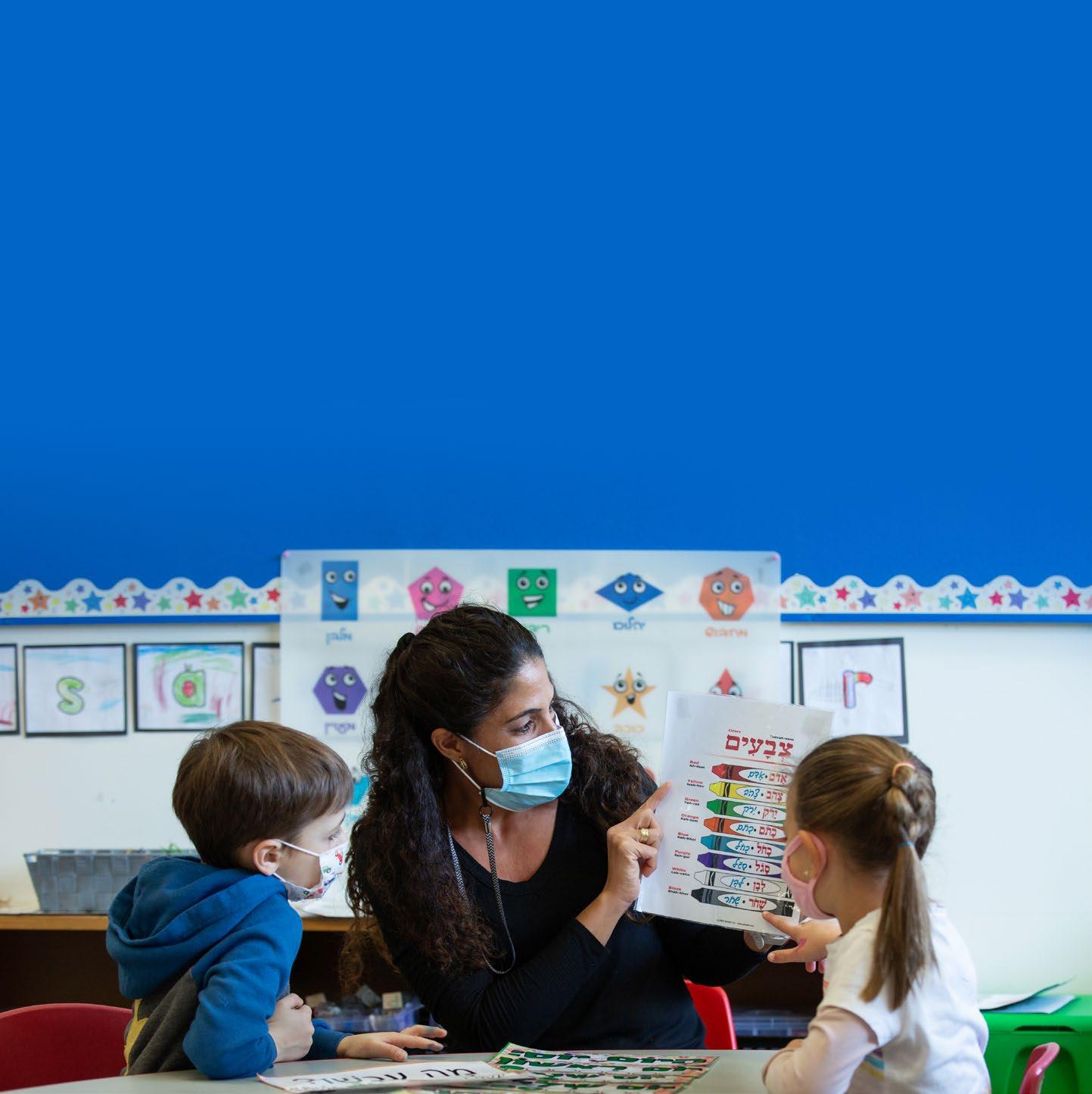
FUNDRAISING SUCCESS FUELS BIG DREAMS
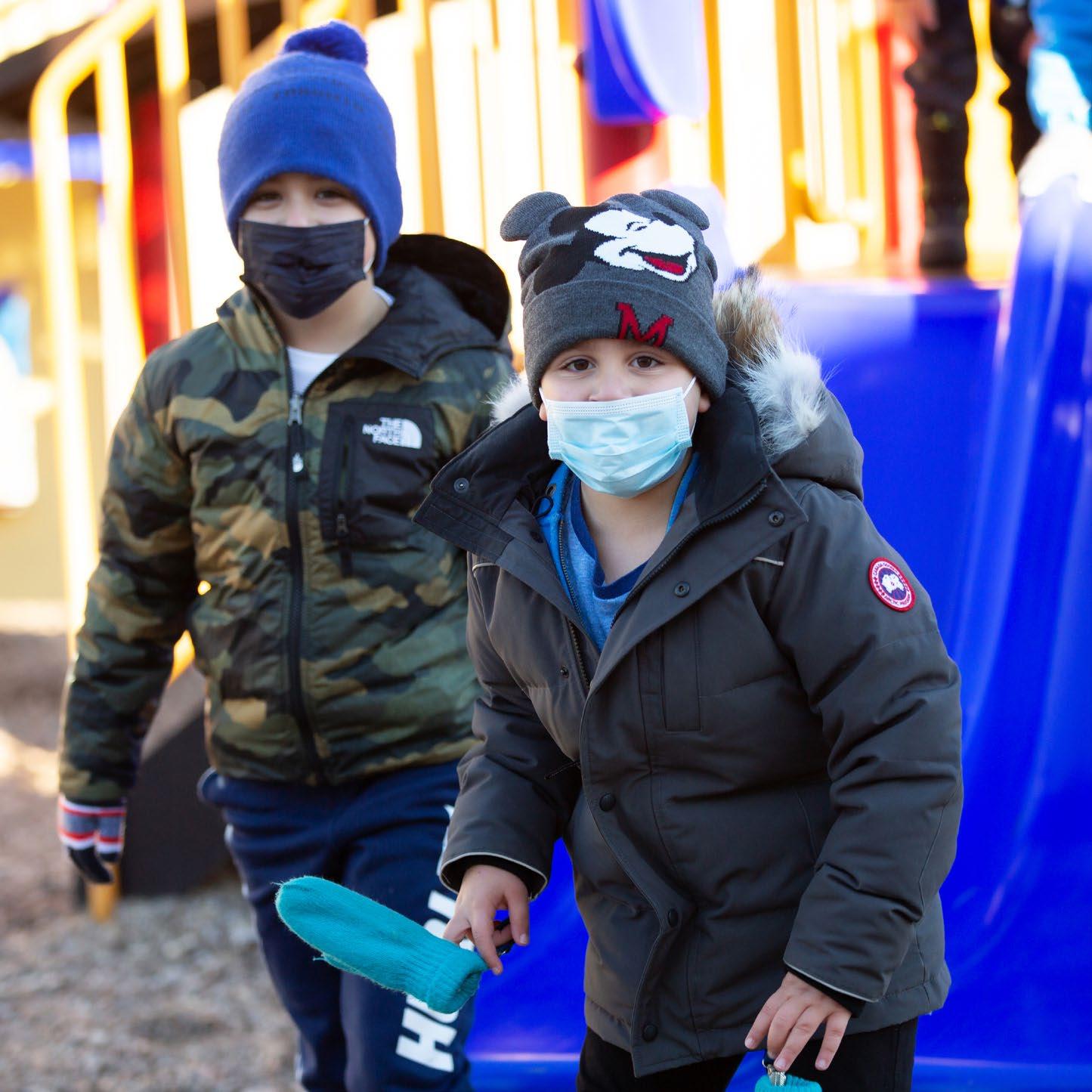
The Bialik community rises to the challenge.
oom fatigued or not, the Bialik community
Zhas come together over the past year, grateful for opportunities to connect in meaningful ways. From online house parties, to trivia nights, a celebrity chef demonstration and a glittering virtual donor recognition evening, people joined in with warm hearts. And they also gave generously.
“Bialik has created a great sense of unity this past year,” says Tina Erlich, a parent of two Viewmount students and Chair of the school’s Development Committee. “We see it not only in the generous giving but also in the way that enrolment has grown. Jewish families are seeing just how important a Jewish day school education is at this time and they want their kids to attend Bialik.” Bialik re-opened its doors in 2021 with 1,388 students across both
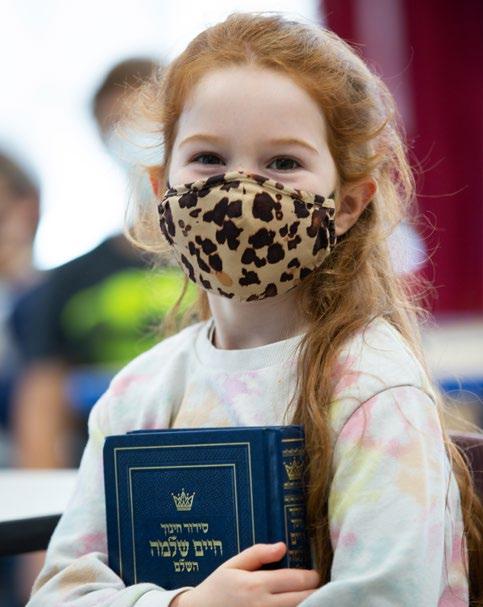
branches, an increase in enrolment of 57 students over last year. While the pandemic placed a new layer of complexity on the school’s fundraising plans, everyone adapted to the situation and philanthropy returned — gaining a momentum that few would have imagined. “We saw what the school did for our kids, making sure that everyone had laptops, staying connected and providing a sense of normalcy,” says Tina. “These actions provided a reason for people to give,” she adds, noting that the pandemic highlighted Bialik’s commitment to academic excellence and care for each and every student.
Typically, the school hosts several giving events annually. The pandemic meant none of these opportunities for connection and community-building could take place in person. But the need was greater than ever. With a commitment to ensuring students could continue at Bialik, even as some families experienced financial hardship, funding was crucial. Not to mention the unexpected COVID-related costs to keep kids safe and healthy when in-person learning resumed.
“The school has big dreams and tuition can only accommodate so much,” explains Heather Gutmann, Director of Development. “Beyond the curriculum, the enhancements that allow Bialik to provide unique programming for the students require additional funding.”
She points to the recently opened Aronson Family STEM Learning Commons — a space that was built to support students’ hands-on learning, design thinking and problem solving, all important skills for our students’ future progress. The space provides a platform for learning and experimentation, while sending the message that kids can be imperfect and that learning through trial-and-error is part of the process.
“Bialik prides itself on academic excellence,” Tina says. She’s quick to point out that it’s not just the learning, but the facilities that support education, whether in arts or STEM. “I feel lucky, every day, that my kids attend Bialik.”
Yet, the main reason that Tina gives back through her fundraising work is to help ensure every Jewish child can obtain a quality Jewish education. Fundraising helps other kids who may need financial support. “We all want the best for our kids,” she says.
And, that spirit came alive over the course of the year’s efforts, as a large number of new donors stepped up to support the Bialik community. During last year’s Day of Giving, a record 792 donors contributed. With every little bit counting, the community also generously attended our special online events and more people came forward to volunteer.
One of the unexpected benefits of being online was the opportunity for grandparents to connect via Zoom from anywhere in the world — and grandparents were thrilled to log on from all over Canada, from the U.S. and Israel to enjoy events with their grandchildren. Tina spoke to many grandparents during her Day of Giving calls and heard countless stories of gratitude at being able to stay connected in this way. “It showed a real strength in our community,” says Heather. “There was a desire to give to something that we all collectively love and that really shines in both good and more challenging times.”
“To describe the last year, silver lining doesn’t do it justice,” says Heather with heightened emotion. “We were blown away; the support was unbelievable. Our families have truly shown us their tremendous commitment to Bialik and all that the school stands for. We feel enormous pride in being part of this amazing community.”
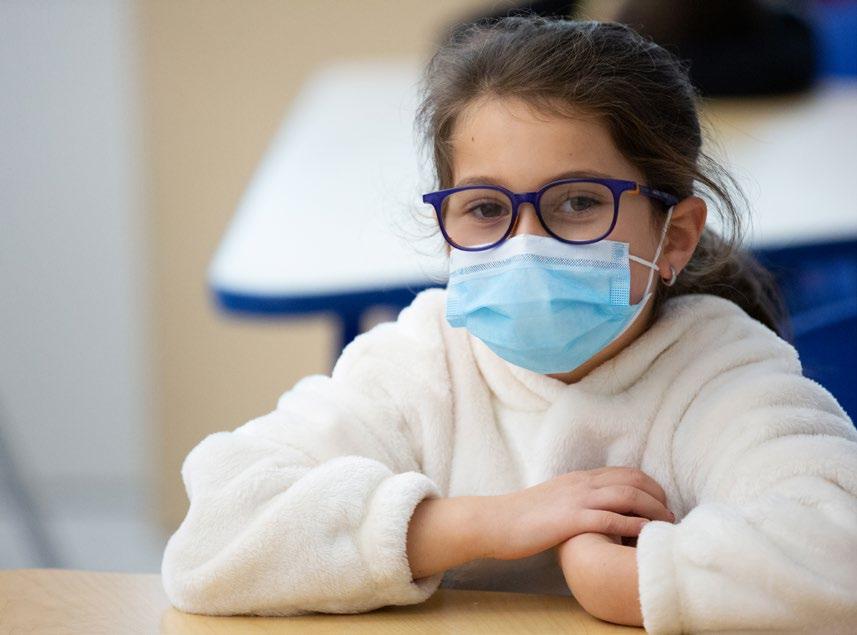
MAKING A DIFFERENCE IN THE
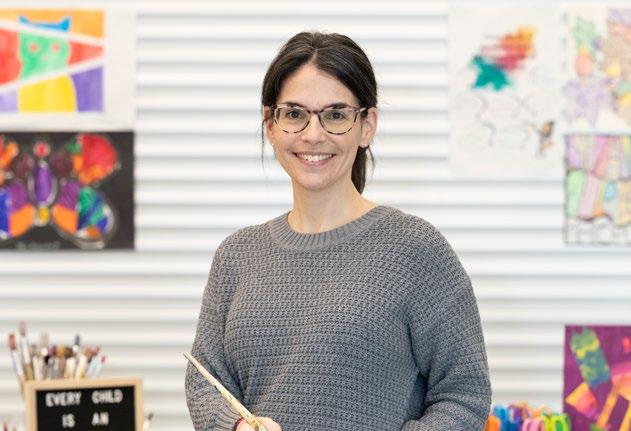
Tanach is the foundation of who we are today as a people.
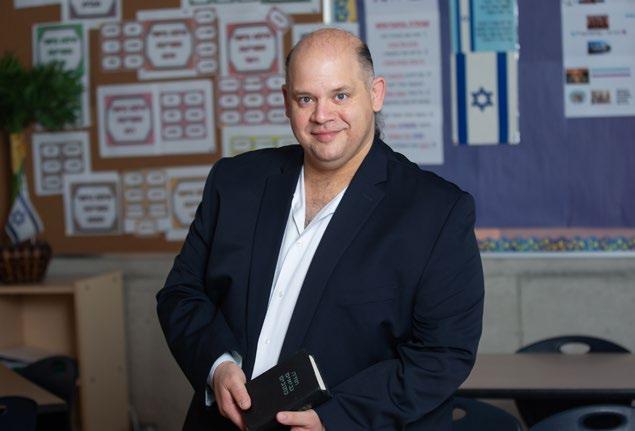
GUY MANNHEIM
What were your career highlights before coming to Bialik?
I had an international opera singing career as a soloist with the Israeli Opera for 15 seasons and was privileged to work with conductors Daniel Oren, Ashger Fisch and Zubin Mehta at the Israel Philharmonic Orchestra. I had the unique experience of performing a leading role composed for me in a modern opera commissioned by the Israeli Opera. I also spent time working in Germany, where I performed leading Wagner roles, which, as a Jew and an Israeli, was very meaningful. I have also taught for a long time, initially at Tel Aviv University. I developed educational programs about music and opera that I taught in schools. What inspires you every day?
My students inspire me every day. There are many similarities between performing opera and teaching. The opera audiences absorb the music and the experience stays with them outside the theatre, and your students absorb learning in class and the experience stays with them after school. It is a joy for me to see our students applying knowledge to their lives, as they become young Jewish thinkers. What would your students be surprised to know about you?
I truly enjoy diving into the Tanach text to reveal the depth of our history and the drama in the stories. When I was studying theatre, I memorized Tanach tracts, which led me to go on to my masters in Jewish education. But my students would be surprised to know that when I was at school, I didn’t enjoy learning Tanach at all!
SUZANNE RAPOPORT
What were your career highlights before coming to Bialik?
Prior to coming to Bialik, I worked in the field of art education and had the opportunity to work at several galleries and museums. I even worked with a Baroque orchestra! I have always loved museums and a career highlight was when I had the opportunity to work, and develop hands-on material, for the Discovery Gallery at the Royal Ontario Museum. It was very inspiring to interact with other museum professionals and to work with interesting artifacts. Being able to roam the ROM galleries, day-in and day-out at a museum I grew up visiting, was memorable. Do you have a quote or saying that you live by and why?
One quote that my students often hear me say is: “There are no mistakes in art. Just happy accidents!” These are the words of the infamous Bob Ross who brought the joy of painting to the masses. This quote captures the ability of art-making to provide students with the opportunity to not only explore new ideas and materials but, most importantly, to develop a growth mindset. Everything is fixable, everything can be transformed. What is your superpower?
My superpower is my ability to multitask. I think every teacher has this superpower. We can be handing out a Band-Aid, answering a math question, helping a student find their shoe, and sharpening a pencil, all at the same time!
LIVES OF THEIR STUDENTS
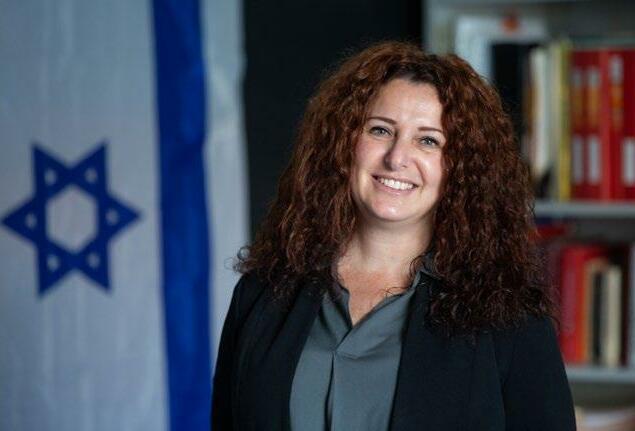
IRIS PERLMAN
What were your career highlights before coming to Bialik?
Before teaching at Bialik, I taught for 12 years in Israel in a community called Tel Mond. I was a history and Arabic teacher in Grades 7-12 and a Mechanechet in Grade 12. My special moments were preparing students for the Bagrut tests — nationwide matriculation tests that are written at the end of twelfth grade. We worked together for many hours and the students used to come to my house in the evening to prepare for the exams. The special connection I made with them lasts to this day. Every year, when I started a new school year, my students who enlisted in the army would visit my class wearing their uniforms. It was a very exciting moment. One of the roles that I found greatly fulfilling was being the social activities coordinator; I was in charge of the student council and led special projects that contributed to the social aspect of the school. What inspires you every day?
The inspiration for me is to find that I learn something new from my students every day. I always enter the classroom with a carefully prepared plan but thanks to the students’ inquiry, I get to touch on aspects that I did not plan. Do you have a quote or saying that you live by?
The best way to start each morning is by following this quote from Steve Jobs: “The only way to do a great job is to love what you do.” I love teaching and being in the company of young people who are thirsty for knowledge. I enjoy exploring new and interesting areas with them, and it keeps me young and enthusiastic.
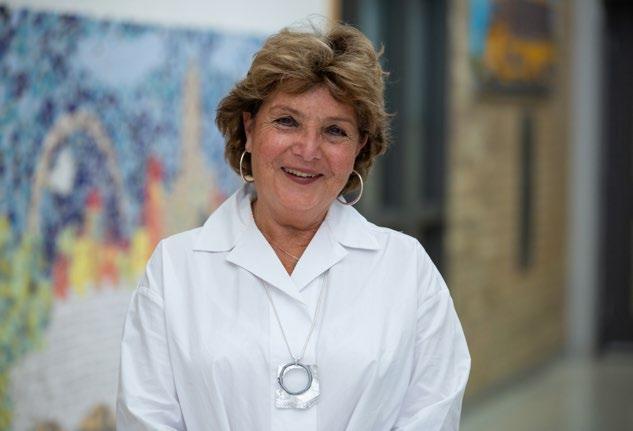
ORIANE FALKENSTEIN
What were your career highlights before coming to Bialik?
When we lived in Los Angeles, I headed up a new Jewish day school for seven years. There was a huge focus on infusing value-based teaching in the curriculum on a daily basis — even naturally at recess. When students disagreed, we would talk it out, encourage them to be accountable, take ownership and figure out how they would handle things if the same problem occurred the next day! What inspires you every day?
I love to teach and every day is “a new day.” I love to see students do a complete 180-degree turn and prove that they “can do it” when they follow my advice — backwards plan, use their time, advocate and seek support. It’s never about marks with me; it’s about building skills and confidence. Do you have a quote or saying that you live by?
Yes it’s “find a way,” and I have passed that on to my students for 20 years at Bialik. There is always a way to tackle something challenging or when things don’t go the way you expect them to. It’s my middle name! What would your students be surprised to know about you?
This would probably be that I can’t ride a bicycle because it was really dangerous in Johannesburg and my parents discouraged it. Funny thing, I taught all three of my own kids to ride their bicycles. My students would probably be surprised that I actually like a lot of rap music, among many other genres!
MEET OUR NEW BOARD MEMBERS
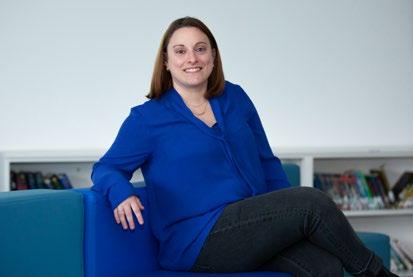
We are pleased to introduce our new Board members and new Board President
MICHAEL VALO’98
Michael is a Bialik alum and parent of two Viewmount students. He is the Ontario Regional Director at the Society of Construction Law and is a partner at Glaholt Bowles LLP, specializing in international construction arbitration.
ERROL TENENBAUM
Parent of a current Viewmount student, Errol has served on Board committees since 2017. He serves as Regional Director of Canadian Friends of Tel Aviv University, is on the Board of JIAS and is a member of UJA Audit Committee. As a partner at Robins Appleby LLP, he practises in taxation, business law and estate planning.
JAY ROLNICK
Parent of two current Himel students, Jay has extensive leadership experience in the financial sector and is the Senior Director of Commercial Performance at Sofina Foods.
MELISSA KRAMER
Melissa Kramer is the parent of two recent Viewmount graduates. She practised corporate law for 20 years and was the Co-Chair of Bialik’s Annual Campaign from 2018 to 2021. She also volunteers with Women’s College Hospital.
BARRY KURETZKY
Barry Kuretzky returns to the Board as a past parent and current grandparent to six Viewmount students, with a seventh starting in JK next year. He chaired Bialik’s former Personnel Committee and served as a member of the most recent Head of School Search Committee. He is a partner at Littler LLP, where he practises employment and labour law.
JUDY NAIBERG
Judy is the grandparent of four Viewmount students. With extensive community fundraising experience, she serves as Director at the Association for the Soldiers of Israel (ASI) and is a docent at the Neuberger Holocaust Education Centre.
NEW BOARD PRESIDENT
JOANNA GROSSMAN’97
As a Bialik alum with two young children at the Viewmount Branch — Benji in Grade 4 and Orly in Grade 1 — it was an easy decision for Joanna Grossman to get involved with Bialik. Having recently served as Vice President of Bialik’s Board, she also worked on the Executive, Finance, Governance, By-Law, Tuition Advisory, COVID, and Head of School Support and Evaluation Committees before assuming the role of Board President.
“Bialik instilled in me a passion for learning and critical thinking, together with the core Jewish values that define me,” says Joanna. “I am proud of the emphasis that Bialik places on Zionism while fostering academic excellence in a non-denominational environment.”
Currently the Assistant General Counsel and Assistant Corporate Secretary at Home Trust Company, Joanna has always recognized the importance of hard work and community engagement. “There is a real sense of pride that comes with this role and the example I am setting for my kids.”
Joanna’s goal during her term of office is to ensure that future generations can continue to enjoy Bialik’s unique approach to Jewish education. With this in mind, a key priority will be to enhance Bialik’s culture of giving, which has never been more important than during these past few years. “The pandemic made us acutely aware that nothing can be taken for granted,” says Joanna. “The sustainability and accessibility of Jewish education is critical, and our community has a particular obligation to ensure that future generations can benefit from the great education at Bialik. Fundraising makes possible the many special programs that distinguish our school and it is imperative that we continue to make this investment in our Bialik community.”

